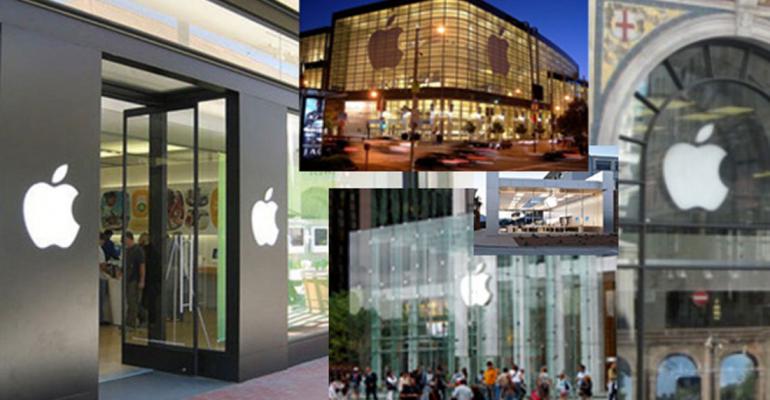Some auto makers want their franchised dealerships to resemble Apple stores, those exemplars of standardized and customer-centric retailing.
Industry consultant Glenn Mercer sees the point – to an extent. Standardization is good, but some auto makers wrongly take it to an extreme by insisting all of a brand’s dealerships must look like clones, he says.
Apple standardizes its product and sales process, not the architecture of its stores, he notes, showing a collage of photos to prove the point. The pictures are of nine Apple stores with strikingly different facades.
The National Automobile Dealers Assn. opposes some auto makers’ design programs that call for same-brand dealerships to look alike. NADA commissioned Mercer to study whether the cookie-cutter approach offers a sufficient return on investment. A summary of his hefty report: It doesn’t.
“I have nothing against standardization per se,” he tells WardsAuto. His beef is with what he sees as over-standardization.
“Every Chevy or Nissan or Fiat store should of course use very similar signage, logos, even exterior looks and colors,” Mercer says. “Otherwise, the customer is not reassured of the identity and trustworthiness of the store.
“But it is important to standardize on what matters, rather than across the board, which increases cost without any known customer benefit.”
He notes how many fast-food chain restaurants follow common design cues at outlets in a variety of settings.
“Subway uses an absolutely standard sandwich-making bar and menu board, because that is what matters to customers: What can I get, and for what price?
“But that bar can be put into a stand-alone store, a strip-mall front or even inside a large gas station, because Subway customers don’t really care about the furniture or the windows or the floor tile.”
Apple stores prominently display the company logo and favor generous use of plate glass. That’s about it for the exterior standardization.
“They don't need a cylindrical portal or a central tower or floor tile that is the same shade everywhere on the planet,” Mercer says, referring to some auto-brand design plans from the school of conformity.
“Standardization is fine, but over-standardization seems more a matter of ego: ‘I like this design, so everyone should follow it.’ Or laziness: ‘I don't want to examine every store for compliance, so just tell them to all be the same.’ Or lack of trust: ‘No way the dealer knows better than I do what the customer wants.’”
Then there’s the multimillion-dollar construction costs. Dealers cover those, with subsidies from auto makers, if work is done according to plan.
Mercer’s report sees no evidence such architectural sameness sells more cars. “It costs a lot of money to no one’s benefit, except, I guess, builders and tile manufacturers,” he says.
Mercer predicts dealership showrooms won’t disappear but will ebb in importance with consumers doing so much car shopping and research online.
He forecasts the franchised dealership system will undergo some changes but remain essentially intact. Startup auto maker Tesla is bucking the system by combining factory-owned showrooms and online ordering. State dealership associations are going to court to challenge Tesla’s direct-sales setup.
Mercer doubts if the likes of the Tesla retailing initiative will work. To him, it’s a market issue, not a legal argument.
“There is a huge gap between what consumers say they want and how they behave,” he says. “Skeptics may say the (dealer-franchise) model doesn’t work, but if someone is spending $35,000 on a car, they usually want to go down the traditional car-buying path.”
But the auto industry is hard to predict, Mercer adds, citing a sequence of events in recent history that once seemed unbelievable.
“A few years ago, if you said Daimler would buy Chrysler, and then a private- equity firm would buy Chrysler, and then Fiat would buy and save Chrysler, and then Chrysler would turn around and save Fiat, well, I wouldn’t have believed the first comment.”





